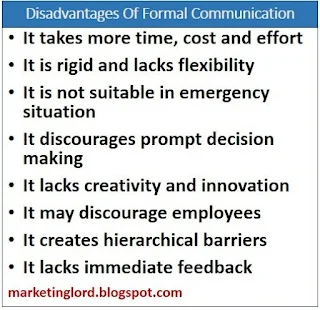Introduction
Formal communication is a systematic flow of information through established channels and routes in the organization. Generally, it is written and follows the chain of command. It is formal and organized than informal communication that helps to obtain the goals and objectives of organization effectively. Letters, memos, emails, meetings, conferences etc. are some examples of formal communication.
Advantages Of Formal Organization
The main advantages of formal organization can be described as follows:
1. Authentic And Reliable
Formal communication is more organized and follows organization's chain of command and passes through appropriate channel. So, it is more authentic and reliable means of communication.
2. Improves Clarity And Transparency
Another advantage of formal communication is that it minimizes the misunderstandings and misinterpretations because of proper format, organization's chain of command and good bonding between management and employees (sender and receiver). So, it ensures clarity and transparency.
3. Improved Efficiency
It helps to fix the responsibilities of the members as per the ability and skills. Formal communication helps to guide employees and control over their performance. So, it improves their efficiency that minimizes the errors and mistakes and improves the productivity of the organization.
4. Documentation Of Records
Messages, data and information can be documented and preserved for future purpose. These records can be used as legal evidence in case of any disputes.
5. Better Decision Making
Data and information provided by formal communication helps the management to make sound decisions. So, it is helpful for making informed decisions.
6. Better Coordination
It provides clear instructions and guidance that helps to team members to perform their jobs effectively without making any mistakes. It helps to enhance coordination and team spirit that makes better working environment in the organization.
7. Secrecy And Privacy
It helps to maintain high level of secrecy and privacy than informal communication.
8. Controllable
Formal communication follows organization's rules and policies and can be controlled by the top level management according to the situation.
9. Better Image And Goodwill
Formal communication looks more professional than other kinds of communication techniques that helps to enhance the image, goodwill and reputation of the company.
Disadvantages Of Formal Communication
The main drawbacks or disadvantages of formal communication are as follows:
1. Costly And Time Taking
One of the major drawbacks of formal communication is that it takes more cost and time than informal communication. It consumes extra cost for stationary items, machines and equipment and takes a lot of time to draft or type the message.
2. Lack Of Flexibility
Formal communication follows strict rules and organizational policies that cannot be changed easily. Therefore, it is more rigid and inflexible mode of communication.
3. Not Suitable
Because of slow delivery of message and information, it lacks immediate feedback. Therefore, it is not suitable in emergency situation.
4. Slow Decision Making
Another disadvantage of formal communication is that it slows down the decision making process. Prompt decision is not possible because it is lengthy and time consuming process. Late decisions may negatively impact the performance of the organization.
Also Read
Advantages And Disadvantages Of Written Communication
Advantages And Disadvantages Of Oral Communication
Advantages And Disadvantages Of Informal Communication
Characteristics Of Formal And Informal Communication
5. Less Effective
Formal communication may not be effective where employees need direct guidance, direction and guidance at work. So, it may increase confusion and doubts in their mind.
6. Lacks Creativity
It follows predetermined rules and policies and instructions and orders are given by the top management that ignores employees' creativity and innovative skills. It may discourage subordinates in the organization.
Pros And Cons Of Formal Communication In Brief
Pros
* It ensures proper flow of information in the organization
* It creates discipline and maintains secrecy
* It increases the efficiency and productivity of the firm
* It facilitates proper documentation of information
* It improves the reputation of the organization
* It improves clarity and accuracy of the message and information
* It can be presented as legal evidence
* It helps to build confidence and trust among the members
Cons
* It consumes more time, cost and resources
* It is rigid and inflexible than other means of communication
* It may demotivate the subordinates
* It is not applicable in the emergencies and at the time of crises
* It lengthens the decision making process
* It discourages creativity and innovation
* It may create hierarchical barriers in the organization








